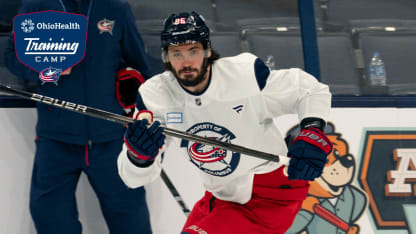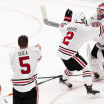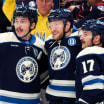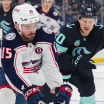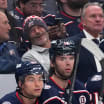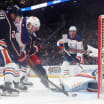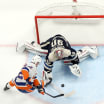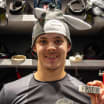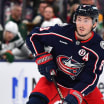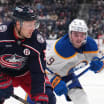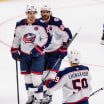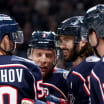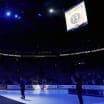In the past two seasons, Kirill Marchenko has become a fan favorite for his talent on the ice and his personality off of it.
The Russian wing is just the second CBJ player in franchise history to begin his NHL career with the team by scoring 20 goals in each of his first two seasons. After setting the Columbus record for rookies with 21 goals in 2022-23, he upped his production to 23 goals and 42 points a season ago.
He's started this fall where he left off, playing on the top line with Sean Monahan and Boone Jenner, and the hope is Marchenko can keep filling up the net while showcasing his trademark smile on and off the ice.
TRAINING CAMP HOME, PRESENTED BY OHIOHEALTH
BlueJackets.com caught up with Marchenko after a practice last week to discuss his return to the United States and his offseason work. This conversation has been edited for length and clarity.
You were saying the other day it takes you a while to pick up English again. How difficult is it when you come back to America?
“Yeah, of course. I just hold some words in my head. I forget a little bit of the rules of English, but now I’ve been here two weeks. I think I am good. It comes back pretty quickly. One, two weeks, you start to think about English.”
When did you first learn English? Because you were pretty good when you got here.
“No, I was terrible in the English when I came. I didn’t learn English, I just tried to speak with everybody the first two, three years, try to find some words in my head. Now I think, I know more English. But I still I don’t know a lot of words and I don’t know a lot of rules, too. Now I think I want to really like step up. I need to start learning more, just like your normal talk.”
Yeah, you can learn the language, but sometimes it’s the interactions that are difficult, right? Like, words have double meanings sometimes.
“It’s more important how guys are talking with me. It’s accent and everything. I can understand you really quick and it’s easy for me, but for some guys who start talking really quickly, I have no idea. Usually it’s people on the street or some stores who just don’t know I am from Russia. I say, ‘What, sorry? I don’t understand, sorry.’ Sometimes it’s hard. But once I am in sports, I am good.”
You learned some English in Russia, right?
“A little bit. I’d say I just tried to speak English with the import guys. We had a lot of Sweden and Finland guys on the team, and they speak only English, and I tried to speak with those guys. I tried to learn something.”
I remember at the end of last season, you talked like you had a good year, but I got the sense you thought it could have been better. Did that motivate you in the offseason?
“I don’t think about it. I don’t follow my emotions that are in my head. I know what I want to do every season. The last three years, I know where I am bad, where I am good, right? I just don’t think about my emotions – good season, bad season. I just try to work. It’s not like if I have a good season, I take two months rest and go to work again. Every time, I take rest for two or three weeks and start working again. I started skating after one month. Still, same process like a year ago and two years ago. Everything is the same. A little different drills on the ice and in the gym, different exercises, but only a little bit. It's more about adapting for me, personally, but the offseason is the same. I don’t think about good season or bad season. Every time, I go to work.”
If you only took two weeks off, that means you started training again in May. That's a long time, isn’t it?
“I don’t know, but it’s not that hard work. I work like that the last three years. I am adapted to it. It’s not a big problem for me. It’s just my work. The offseason, I take two, two and a half weeks off, take the time with my family, and come back to the practices. I enjoy it. I like to go in the gym. I’m not a really big guy. It is my (body) structure. But I like to work in the gym. It’s not like, the first two months, I like it, and after, I say, ‘What the (heck)? Too many gyms.’ But yeah, it is my work and I like to do it.”
Do you get a chance to see Yegor Chinakhov and Dmitri Voronkov much in the summer?
“Not a lot, but we practiced together a couple of times. I skate in a different place, but every Friday, we have a gameday, just scrimmage, and I come and play with those guys in the games. I have a good summer, but I take the time with my family. I see those guys every day all season. Need a rest a little bit. (Laughs.)”
Since you’ve been working out since May, four months later, you have to be ready for some games, right? You want to see that hard work pay off.
“Games are way different. You can work one year or two years or six months, five months (in the gym) – it doesn’t matter how much you work or how you work, the first two games are hard every time because it’s different. It’s just different. A lot of guys who have experience in the NHL, they say the best practice is in the game. It’s good for your body and everything.”
In your first two years here in Columbus, fans really enjoyed watching you play. How cool is it to have that support?
“It’s really important for me. I love the fans here. It doesn't matter how we play, they are with us every time. I want to say thank you. I enjoy it, of course. It’s big support for me, too, when we have the fans and they are like, ‘Marchy! Marchy!’ It’s really good. My first goal is to do my best and be a good team on the ice and doing what I can do.”

